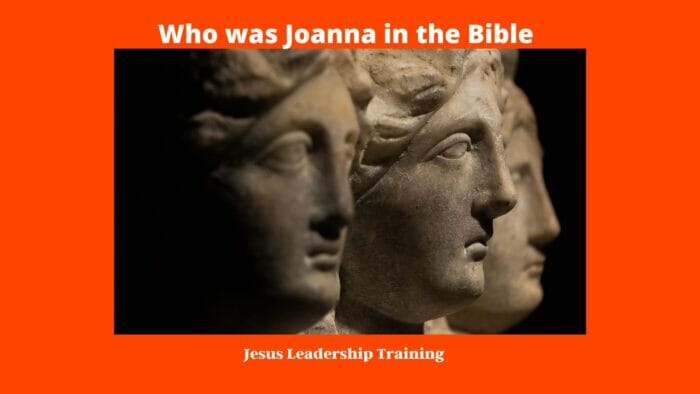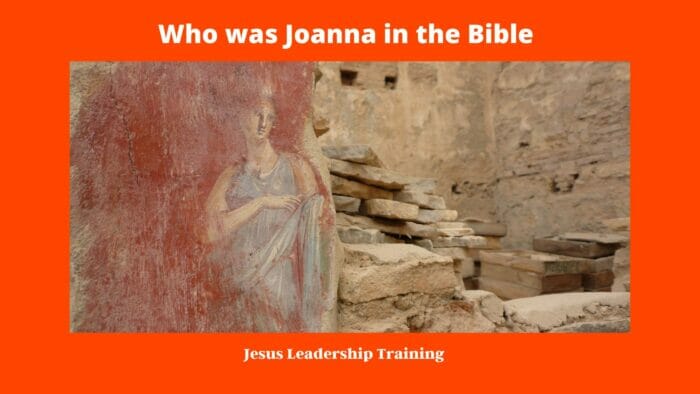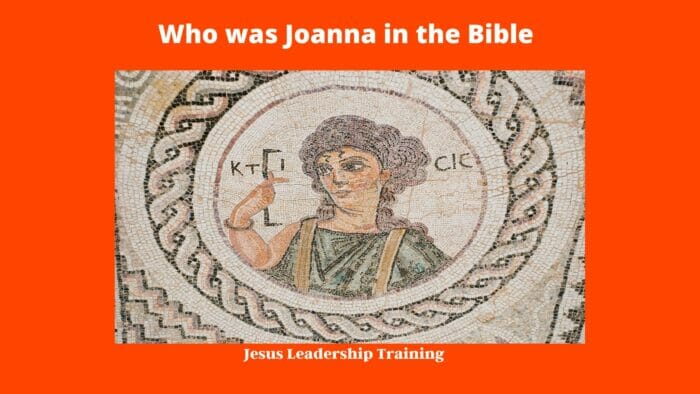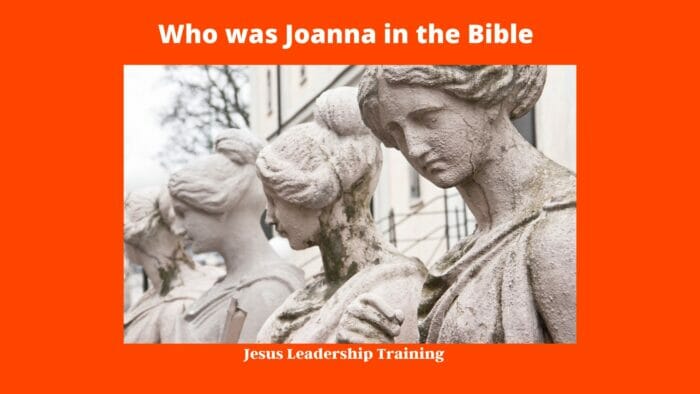Dive deep into understanding who Joanna was in the Bible. Learn about her lineage, her contributions, and her impact on Christianity.
Table of Contents
Who was Joanna in the Bible? ????
Who was Joanna in the Bible – Joanna, though not as frequently mentioned as some other biblical figures, played a significant role in the New Testament. She was one of the women who supported Jesus and his disciples, and her story gives us a glimpse into the lives of those who stood by Jesus during his ministry.
Here’s a table that presents the Biblical, Historical, and Catholic Traditions regarding Joanna in the Bible:
| Aspect | Biblical Account | Historical Context | Catholic Traditions |
|---|---|---|---|
| Identity | Joanna was the wife of Chuza, steward of Herod Antipas. | Chuza’s position implies that Joanna was of high social standing. | Joanna is recognized as a saint. Her feast day is celebrated on May 24. |
| Associations | Joanna was one of the women who supported Jesus and his disciples. | Her association with Jesus, given her status, might have been controversial. | Joanna is commemorated as one of the Holy Myrrhbearers, women who anointed Jesus’ body after his death. |
| Notable Moments | Joanna is mentioned as one of the women who visited Jesus’ tomb after His resurrection and found it empty. | This testimony holds historical weight as women’s testimonies were often undervalued in that era. | The Catholic Church honors Joanna for her courage and faith, especially for her role in proclaiming the resurrection. |
| Legacy | While not as frequently mentioned as some, Joanna’s support for Jesus’ ministry is significant. | Joanna’s choice to follow Jesus, given her societal position, offers insight into the diverse group of Jesus’ followers. | Joanna’s story serves as a testament to unwavering faith, transcending societal norms and positions. |
Please note that the table is a concise summary, and while it draws on established knowledge, there’s always more depth and nuance to be explored in each of these aspects.
What was Joanna’s Lineage? ????
Joanna hailed from a prestigious lineage, being the wife of Chuza, who was the steward of King Herod Antipas. This position indicates that she belonged to the elite class of society, which made her association with Jesus and the disciples even more intriguing.
Here’s a table detailing facts about King Herod (specifically Herod the Great and Herod Antipas, as both played roles during the timeline of Jesus’ life):
| Fact Category | King Herod the Great | Herod Antipas |
|---|---|---|
| Reign | 37 BC – 4 BC | 4 BC – 39 AD |
| Title | King of Judea | Tetrarch of Galilee and Perea |
| Relationship | Father of Herod Antipas | Son of Herod the Great |
| Major Constructions | Renovation of the Second Temple in Jerusalem, the building of Caesarea Maritima, and the fortress at Masada. | Construction of the capital city Tiberias on the western shore of the Sea of Galilee. |
| Role in Jesus’ Life | Ordered the Massacre of the Innocents in an attempt to kill the newborn “King of the Jews” (Jesus) in Bethlehem. | Played a role in the trial of Jesus and was the ruler who ordered the beheading of John the Baptist. |
| Death | Died in Jericho in 4 BC. His death is often associated with the biblical account of the birth of Jesus. | Exiled to Gaul (modern-day France) in 39 AD after being accused of conspiracy by the Roman Emperor Caligula, where he died. |
| Character | Known for his architectural projects but also for his paranoia and cruelty, especially towards the end of his reign. | Known for his illicit marriage to Herodias (his brother’s wife) and his role in the execution of John the Baptist. |
| Political Relations | Maintained a complex relationship with the Roman Empire, managing to keep favor with successive emperors. | Had a tumultuous relationship with the Roman Empire; was eventually accused of treason and exiled. |
It’s important to note that while King Herod the Great died shortly after Jesus’ birth, Herod Antipas played a more direct role in Jesus’ adult life. The table above offers a summary, but the historical context and intricacies of their reigns can be further explored in detailed historical and biblical accounts.

Historical Timeline of Joanna’s Time ⏳
During Joanna’s time, the Roman Empire had a stronghold over the region. King Herod Antipas, under whom Chuza served, ruled Galilee and Perea. The political and religious tensions were palpable, with many awaiting a Messiah. Joanna’s association with Jesus, in such turbulent times, speaks volumes about her faith and commitment.
Here’s a table detailing a timeline of King Herod the Great’s life and some of his major accomplishments in the first century BC:
| Year (BC) | Event/Accomplishment |
|---|---|
| 73 BC | Birth – Herod the Great is born in Idumea. |
| 47 BC | Appointed Prefect – Herod is appointed as the prefect of Galilee by Julius Caesar’s representative, Hyrcanus II. |
| 40 BC | King of Judea – The Roman Senate, under Mark Antony’s influence, appoints Herod as the “King of the Jews.” |
| 37 BC | Takes Jerusalem – After a lengthy siege, Herod captures Jerusalem and solidifies his rule. |
| 36–20 BC | Building Projects – Herod begins major construction projects, including fortresses like Herodium and Masada. |
| 20–18 BC | Second Temple Renovation – Begins his most famous project, the expansion of the Second Temple in Jerusalem. |
| 25–13 BC | Caesarea Maritima – Constructs the harbor city of Caesarea Maritima, named in honor of the Roman Emperor Caesar Augustus. It includes a massive harbor, a theater, an amphitheater, and a hippodrome. |
| 15 BC | Aqueduct – Constructs an aqueduct to bring water to Jerusalem. |
| 13–10 BC | Samaria Reconstruction – Rebuilds the city of Samaria and renames it Sebaste in honor of Emperor Augustus. |
| 4 BC | Death – King Herod the Great dies in Jericho. Shortly before his death, he orders the execution of several family members due to internal conflicts and paranoia. |
This table provides a concise timeline of King Herod the Great’s life and major accomplishments during the first century BC. However, it’s important to remember that Herod’s reign was complex, filled with political maneuverings, and had a profound impact on the Judea region. This table only touches on some highlights, and there’s much more depth to explore in detailed historical accounts.

What does Joanna Mean – English, Hebrew, Greek ????
The name “Joanna” is of Hebrew origin, translating to “God is gracious.” In Greek, the name is rendered as “Ioanna.” This name’s significance might indicate the grace Joanna experienced in her life and the grace she extended to others through her support of Jesus’ ministry.
What Do We Know About Joanna? ????
Major Moments in the Life of Joanna ⭐
Joanna’s most notable moment in the Bible is her presence at Jesus’ tomb after His resurrection. Alongside Mary Magdalene and Mary, she went to the tomb, only to find it empty. Their proclamation of the risen Christ was one of the first testaments to Jesus’ resurrection.
While the biblical accounts of Joanna are limited, here’s a table highlighting the major moments and mentions of Joanna in the New Testament:
| Scripture Reference | Major Moments in the Life of Joanna |
|---|---|
| Luke 8:1-3 | Supporting Jesus’ Ministry: Joanna is listed as one of the women who provided for Jesus and the Twelve Apostles out of her own means. |
| Luke 24:10 | Witness of the Empty Tomb: Joanna, along with Mary Magdalene and Mary the mother of James, visits Jesus’ tomb and finds it empty. They are then told by angels that Jesus has risen. |
| Possible Further Mentions | While the Bible does not delve deeper into Joanna’s life, her status as the wife of Chuza, steward to King Herod Antipas, implies she had a unique position among Jesus’ followers. She may have faced challenges given her connection to Herod’s court, while also being a follower of Jesus. |
It’s important to note that Joanna’s mentions in the New Testament are brief, and much of what we can infer about her comes from these limited mentions. However, her support for Jesus’ ministry and her role as a witness to the resurrection mark her as a significant figure in the early Christian community.
Joanna’s Personal History ????
Though the Bible doesn’t offer a detailed biography of Joanna, her status as Chuza’s wife suggests she led a life of comfort and privilege. Yet, she chose to follow Jesus, an act that showcased her strong faith and possibly even courage, given the societal norms of her time.
What the Story of Joanna Means for Us ❤️
Joanna’s story is a testament to unwavering faith. Despite her social standing, she chose a path less traveled. For us, it’s a reminder that genuine faith transcends societal roles and norms. It challenges us to stand by our convictions, no matter our background.
Here’s a table that draws insights from the story of Joanna in the Bible and translates them into applications for our lives today:
Table: Insights from the story of Joanna in the Bible and Translates them into Applications for our lives today
| Insight from Joanna’s Story | Application for Today |
|---|---|
| 1. Faith Beyond Social Status | Authenticity in Convictions: Regardless of our position or status in society, our genuine beliefs and convictions should guide our actions. We must stay authentic to what we believe is right. |
| 2. Supporting Righteous Causes | Generosity in Action: We can use our resources, be it time, talents, or wealth, to support causes that align with our values and beliefs. |
| 3. Courage Amidst Contradictions | Steadfastness in Adversity: When our beliefs contradict societal or peer expectations, we should display courage and stay true to our convictions. |
| 4. Being a Witness to Truth | Speaking Up: Like Joanna proclaimed the resurrection, we should not hesitate to stand as witnesses to the truths and values we hold dear, even if they might be unpopular or challenging to convey. |
| 5. Role of Women in Early Christianity | Empowerment & Equality: Joanna’s story reminds us of the vital roles women played in the early Church. Today, we should continue to empower and recognize the contributions of women in all spheres. |
| 6. Faith Beyond Cultural Expectations | Defying Stereotypes: Our faith and actions should defy cultural stereotypes, reminding ourselves and others that true belief goes beyond societal expectations. |
| 7. Association with a Community of Believers | Building Strong Connections: Like Joanna found community among the disciples and other women, we should seek and nurture associations that uplift our beliefs and foster mutual growth. |
Joanna’s story, although briefly mentioned in the Bible, provides timeless lessons and applications that can inspire and guide us in our daily lives.

What was Joanna’s Mission? ????
Joanna’s mission seemed clear: support Jesus and his disciples. Given her resources and position, she could have played a pivotal role in financially supporting Jesus’ ministry, ensuring that the Good News reached far and wide.
What Archaeology has been discovered concerning Joanna ????
While there isn’t direct archaeological evidence pointing to Joanna, discoveries from her era provide context to her life. Artifacts from the Herodian period and writings from historians like Josephus can offer insights into the societal dynamics and challenges Joanna might have faced.
King Herod the Great is a significant figure in ancient history, and various archaeological findings over the years have shed light on his reign and the architectural wonders he commissioned. Here’s a table highlighting some of these archaeological findings:
| Date of Finding | Archaeological Finding | Time it Represented | Insights Revealed |
|---|---|---|---|
| 1838 | Herodium | 15-10 BC | This fortress-palace complex, located south of Jerusalem, was one of Herod’s grandest projects. It is believed to be the site where Herod was buried. The findings here showcased Herod’s architectural ambition and his desire to leave lasting monuments. |
| 1961 | Masada | 37-31 BC | A mountaintop fortress near the Dead Sea. Masada became renowned for the Jewish resistance against Roman siege in 73-74 AD, but its fortifications were built by Herod. The site demonstrated Herod’s strategic and architectural prowess. |
| 1963-1968 | Theatre in Caesarea Maritima | 22-10 BC | Herod built a grand theater in his port city of Caesarea. This finding revealed the Roman influence on local architecture and Herod’s intent to Romanize his kingdom. |
| 2007 | Tomb at Herodium | 1st century BC | A monumental tomb believed to belong to King Herod was unearthed at Herodium. Though the identification isn’t conclusive, its discovery might pinpoint the final resting place of the King. |
| 2008-2010 | Royal Room in Herodium | 15-10 BC | Excavations in the Herodium complex uncovered a lavish, fresco-decorated room believed to be part of Herod’s royal apartments, further testifying to the King’s luxury and grandeur. |
| 2013 | Coinage from Masada | 4 BC – 4 AD | Coins stamped by Herod the Great were discovered at Masada, offering tangible evidence of Herod’s reign and control over the region. |
| 2017 | Aqueduct in Caesarea Maritima | 1st century BC | An aqueduct system in Caesarea, attributed to Herod’s grand development of the city, was further explored. It emphasized Herod’s focus on infrastructure and urban development. |
This table provides a snapshot of the significant archaeological findings associated with King Herod the Great. Each discovery has added layers to our understanding of this dynamic ruler and the era he represented.

Lessons We Can Learn from the Life of Joanna ????
Joanna teaches us the importance of steadfast faith, even in the face of societal expectations. Her story underscores the significance of supporting righteous causes and standing by one’s convictions.
Here’s a table outlining lessons we can learn from the life of Joanna from the Bible and how we might apply and display these lessons in our lives today:
| Lessons from Joanna’s Life | How to Display Today |
|---|---|
| 1. Faith Transcends Social Status | Authenticity in Convictions: No matter our position in society, stay genuine in our beliefs. Engage in acts of kindness and charity regardless of social expectations. |
| 2. Boldness in Belief | Stand Up for What We Believe: Voice our beliefs and convictions even if they’re unpopular or might face criticism. Take part in events, causes, or groups that align with our values. |
| 3. The Power of Financial Support | Generosity with Purpose: Use our resources, be they time, skills, or wealth, to support causes and communities we believe in. Regularly donate or volunteer for causes close to our heart. |
| 4. The Role of Women in Spiritual Matters | Empower and Encourage Women: Actively support and encourage women in spiritual and leadership roles within our communities. Recognize and celebrate their contributions. |
| 5. Being a Witness to Significant Events | Share Personal Experiences: Speak about our personal transformations, experiences, or moments of realization to inspire and guide others. Start conversations about topics that matter. |
| 6. Staying Committed Amidst Opposition | Stay Steadfast in Challenges: Even when faced with opposition or societal pressures, remain steadfast in our convictions. Join or form support groups for mutual encouragement. |
| 7. The Value of Community | Seek and Nurture Connections: Build and nurture relationships with like-minded individuals. Engage in group activities, workshops, or community services that align with our beliefs. |
The life of Joanna, though briefly mentioned in the scriptures, offers valuable lessons on faith, commitment, and the role of individuals in larger community narratives. These lessons can guide and inspire our actions and decisions in contemporary settings.
How was Joanna Important to Christianity? ✝️
Joanna, through her unwavering support of Jesus’ ministry, became a beacon of hope. As one of the women testifying to Jesus’ resurrection, she played a pivotal role in establishing the foundational belief of Christianity: the resurrection of Christ.
Final Thoughts ????
- Joanna’s Elite Background and Faithful Choices: It’s intriguing how someone from the upper echelons of society could be such an ardent follower of Jesus, teaching us that faith transcends societal barriers.
- Proclamation of the Resurrection: Joanna’s testimony of the empty tomb is pivotal, as it reinforces the cornerstone of Christian belief.
- Supporting Righteous Causes: Joanna’s support for Jesus’ ministry, both morally and possibly financially, shows the impact one can make when resources are channeled for good.
- Courage in Convictions: In a time of political and religious unrest, Joanna’s association with Jesus showcased her bravery.
- The Universality of Faith: Joanna’s story is a testament to the idea that faith is universal, not restricted by class, gender, or social norms.
- The Power of Testimony: By sharing the news of Jesus’ resurrection, Joanna played a role in spreading Christianity in its nascent stages.
- Grace in Name and Deeds: Just as her name suggests, “God is gracious,” Joanna’s life was a testament to the grace she received and gave.
FAQs
- Why is Joanna’s background significant?
- Joanna’s elite background contrasts with her association with Jesus, highlighting the universality of faith and the challenges she might have faced.
- How did Joanna support Jesus’ ministry?
- While not detailed, given her status, Joanna likely provided financial support to Jesus’ ministry.
- Is there direct archaeological evidence about Joanna?
- Direct evidence about Joanna is scarce, but artifacts from her time offer context to her life.
- Why don’t we hear much about Joanna in the Bible?
- While Joanna’s mentions are limited, her impact is profound. It emphasizes that every believer, regardless of the frequency of their mention, holds significance in God’s story.
- What lessons can we draw from Joanna’s life?
- Joanna’s life teaches us about unwavering faith, courage in convictions, and the importance of supporting righteous causes.
- Was Joanna a prophetess?
- The Bible doesn’t label Joanna as a prophetess, but her declaration of Jesus’ resurrection was indeed a proclamation of fulfilled prophecy.
New Testament Commentaries
Below is a table featuring some renowned New Testament commentaries, their publishers, and websites where they can be found. Please note that availability may vary and it’s always beneficial to check multiple sources for acquiring these commentaries.
| Commentary Name | Publisher | Website |
|---|---|---|
| The New International Commentary on the New Testament | Eerdmans | Eerdmans |
| Word Biblical Commentary | Zondervan | Zondervan |
| Baker Exegetical Commentary on the New Testament | Baker Academic | Baker Academic |
| The New Testament for Everyone | Westminster John Knox Press | Westminster John Knox Press |
| Tyndale New Testament Commentaries | InterVarsity Press | InterVarsity Press |
| Expositor’s Bible Commentary | Zondervan | Zondervan |
| The Anchor Yale Bible Commentary | Yale University Press | Yale University Press |



